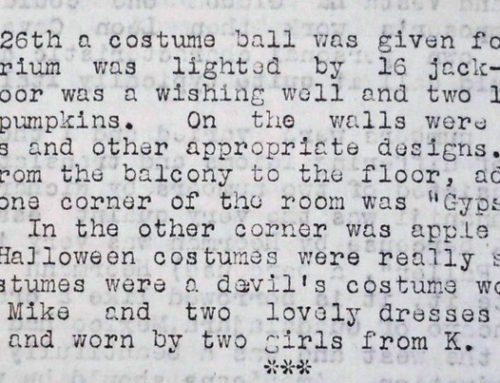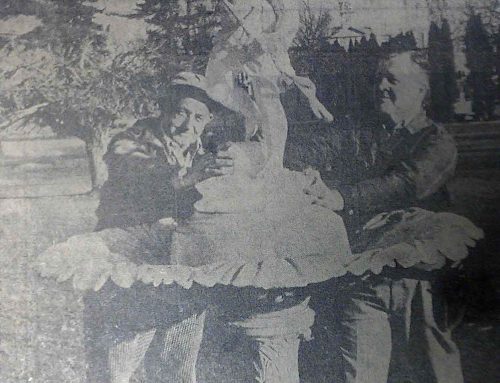 The following is an obituary published in a Salem paper June 15, 1930. Dr. Lewis Frank Griffith, then Assistant Superintendent of the Oregon State Hospital, died June 14.
The following is an obituary published in a Salem paper June 15, 1930. Dr. Lewis Frank Griffith, then Assistant Superintendent of the Oregon State Hospital, died June 14.
Served faithfully at State institution 39 Years; Widely Honored
—
Dr. Lewis Frank Griffith, recognized as one of the leading alienists and psychiatrists in the United States, passed away at 5:35 o’clock yesterday evening at his home here. Dr. Griffith, who had been seriously ill for several months and whose death has seemed imminent more than once in that period died peacefully, being unconscious the last few hours. His immediate family and a sister, Mrs. Helen Giese of Portland, were with him when death stretched forth his hand.
Lewis Frank Griffith was born June 3, 1868 on the old Griffith homestead 12 miles east of Salem in the Waldo hills. He was the son of Lewis C. and Susan Margaret Griffith, early Oregon pioneers. His first schooling was in the little country school of his district, but he entered the Salem schools while still in the elementary grades. Later he was graduated from Willamette university and after that he taught school for a time in the Eldriedge school in Mission Bottom.
Devotion to Duty
Outstanding Trait
Following his teaching experience he attended medical college at Knoxville university, Tenn. And was graduated form that institution with high honors. He was married 34 years ago to Julia Metschan, daughter of Phil Metschan, Sr. then state treasurer for Oregon. She survives him.
Upon returning to Salem from his medical studies 39 years ago, Dr. Griffith became connected with the staff of the Oregon state hospital for the insane, with which he had been connected ever since. For nearly a quarter of a century he served as assistant superintendent.
For over 25 years he served at the hospital without a vacation, being thoroughly devoted to his work for the wards of the hospital and it was largely due, his associates say, to his constant attention to duty that his physical breakdown came.
For a few years Dr. Griffith served as acting superintendent of the institution when Superintendent R. E. Lee Steiner was transferred to take temporary charge of the state penitentiary. Dr. Griffith served as president of the Illahee country club, was for many years a member of the Salem Elks lodge, was prominent in medical societies in which he served as an official, and in other ways devoted his time to civic duties. Recognized Leader It was as a psychiatrist that Dr. Griffith was an outstanding member of the medical profession, not only in the Pacific northwest but on the Pacific coast. There were few cases of importance in the northwest during the last several years in which expert testimony was required that he was not called in on. Dr. Griffith frequently had opportunity to better his financial condition by becoming connected with private sanitaria, but consistently declined, believing that he had a wider field for service, both for the patients involved and for advancement of his branch of the medical profession, with his work at the state hospital. Retiring in the extreme, Dr. Griffith had no political ambitions whatever, though he had a wide friendship over the state that had been attracted him by his pleasing personality and his ability. He is survived by his widow; two daughters Mrs. Margaret Ford of Salem and Mrs. R. Stump of Monmouth; and by sisters, Mrs. Helen Giese of Portland, and Mrs. Virginia Mill who lives in the east. Funeral services will be held Monday afternoon at 2 o’clock at the W.T. Rigdon and Son chapel with Dr. W.C. Fantnar officiating. Interment will be made at the Mt. Crest Abbey mausoleum. [1] Dr. Steiner stepped down as superintendent May 31, 1919. Griffith was appointed by the board as superintendent in his stead until Steiner was reinstated January 22, 2, 1920. As the Biennial Report of the Oregon State Board of Control (Issue 4) reports: “On February 1, when Dr. Steiner resumed his work as superintendent of the state hospital, Dr. Griffith assumed his former duties as first assistant superintendent. The relation of the two men to each other and to the board is most amicable, and the affairs of the institution throughout the biennium have been conducted in the most efficient and successful manner. The board expressed in appropriate resolutions their appreciation of Dr. Griffith’s executive skill.”
As Psychiatrist





